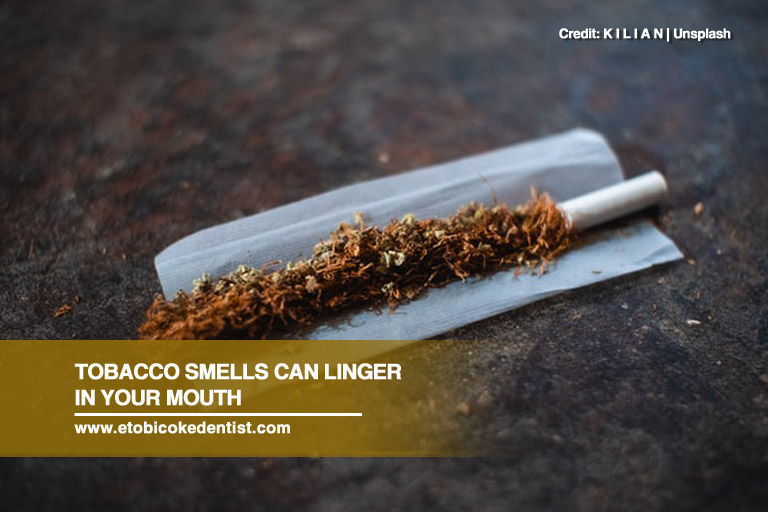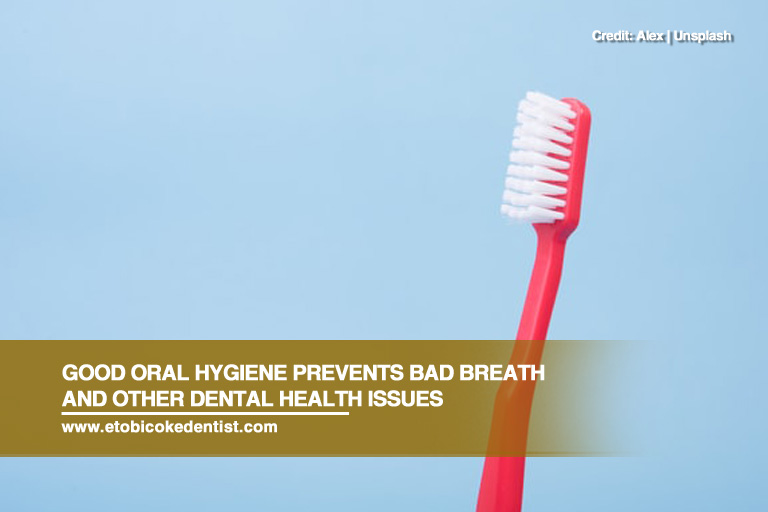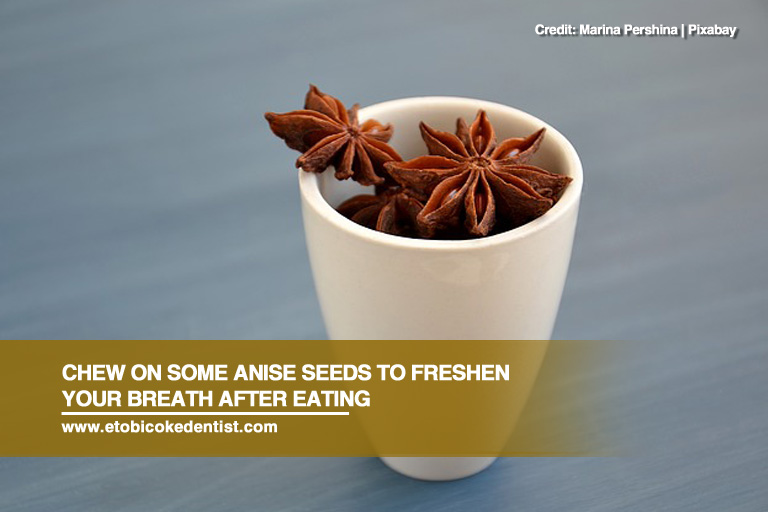
If you are currently suffering from halitosis, or bad breath, we understand that it can make you more self-conscious and less self-confident. However, there are a variety of things you can do about it.
Knowing what causes bad breath will allow you to determine the best course of action to eliminate it. Learn more about halitosis so you can fight back and regain your smile and confidence.
Causes of Bad Breath
There are a number of reasons an individual can develop bad breath. These include:
- Pungent Food

What you choose to consume can affect how your breath smells. Garlic, onions, and other pungent food items are some of the major culprits. As they are chewed up and broken down into smaller particles, some pieces can get stuck in between teeth. These have strong odours that can linger in your mouth and digestive tract, causing bad breath.
- Poor Dental Hygiene
Regular brushing and flossing help you to get rid of plaque and food particles that can slowly build up on your teeth or dentures. The lack of good oral hygiene habits (i.e. irregular and infrequent brushing or flossing) will allow odour-causing bacteria to accumulate in your mouth, making your breath smell bad.
- Dry Mouth
Having a dry mouth is a sign that your mouth is not producing enough saliva. Saliva is a necessary component of the ecosystem of your mouth. It serves as a natural cleanser and defense against foreign odour-causing bacteria.
- Tobacco Use

Tobacco products are known for their strong scents. Smoking and/or chewing on these will let that scent stick to your mouth, causing halitosis. In addition, frequent and prolonged use increases your chances of developing gum disease, which also causes bad breath.
- Ulcer
Did you know that there is a strong link between bad breath and ulcer? Ulcers are caused by a type of bacteria, Helicobacter pylori, which can also trigger bad breath.
Symptoms of Bad Breath
Halitosis is often caused by other issues and may come with the following symptoms:
- Dry mouth, thick saliva
- White coating on the tongue
- Plaque or tartar build-up on teeth
- Burning tongue
- Mouth sores
- Persistent sour, bitter, or metallic taste in the mouth
By yourself, it can be a challenge to determine whether you have bad breath or not. This is especially because you may be so used to the smell and taste of your mouth that your brain doesn’t register it. If you want to confirm this, you can always ask someone you trust.
However, if no one is available, you can ascertain how your breath smells by licking your wrist. Do not wipe your saliva off and leave it to dry instead. After it has dried, smell your wrist. If the area with your dried up saliva smells, it is likely that you have halitosis.
Treatment for Bad Breath
If you do have bad are several ways to remedy bad breath. Here are some solutions you can follow:
- Good Dental Hygiene

Preventing bad breath can be as simple as maintaining good oral hygiene practices including:
- Brushing
Brush your teeth after every meal or at least twice a day (once in the morning and once in the evening before you sleep). Use a fluoride toothpaste and brush your teeth for 2 minutes. Doing this helps to prevent bad breath and tooth decay.
- Tongue Cleaning
The tongue can also harbour odour-causing bacteria, food particles, and dead cells. Cleaning your tongue is just as important as brushing your teeth in keeping bad breath at bay.
- Flossing
While brushing helps clean your teeth, this does not clean all of their surfaces. With flossing, you can clean between your teeth and remove plaque and food particles that might be stuck there.
- Caring for Dental Appliances
Whether you’re using dentures, a mouthguard, or braces, you must make it a habit to clean them regularly. Cleaning your dentures and other dental appliances removes the bacteria and food particles that might otherwise accumulate on them and cause bad breath and other oral health issues.
- Stay Hydrated
To keep dry mouth at bay, you should hydrate yourself. Drink adequate amounts of water. Avoid smoking and drinking alcohol since these can dehydrate your mouth. You can also stimulate saliva production by chewing gum.
- Certain Foods and Beverages
- Anise or Fennel Seeds

One way to get rid of bad breath is by chewing on anise or fennel seeds. These seeds are a common remedy in some parts of India. They use these seeds as their after-dinner mint. The seeds have aromatic essential oils, which can help to freshen your breath.
How you want to eat these is up to you. You can coat the seeds with sugar, roast them, or just eat them as they are. You can purchase anise and fennel seeds at health food stores.
- Apple
As it turns out, an apple a day also keeps halitosis away. If you like to eat dishes with large amounts of garlic, you can counter it by chewing on an apple. Apples have natural compounds that can neutralize the smell of garlic.
In addition, the high-fibre content of apples allows it to double as a teeth-cleaner. While it is not a substitute for a toothbrush, chewing on an apple can dislodge food particles that can get stuck on or between your teeth.
- Green Tea
Drinking green tea can help you get rid of bad breath. The deodorizing and disinfectant properties that are in green tea can freshen your breath temporarily.
To keep bad breath at bay, you can brew 2 cups of green tea before going to bed. Once brewed, cool them in the refrigerator while you sleep. You can bring your cooled tea with you as you go to work the next day by pouring it into a tumbler or bottle. Throughout the day, slowly sip on it to freshen your breath.
- Homemade Mouthwash

If you run out or do not have a mouthwash, then fret not, you can concoct one yourself using ingredients you can find at home:
- Baking Soda Mouthwash
Baking soda, also known as sodium bicarbonate, can kill germs and bacteria. These antibacterial properties make it a staple for cleaning home kitchens while being safe for your mouth.
To use baking soda mouthwash:
- Prepare 1 cup of warm water.
- Add 2 teaspoons of baking soda and stir.
- Swish it around your mouth for at least 30 seconds, then spit it out.
- Vinegar Mouthwash
Another ingredient you can use to combat halitosis is vinegar, as it has a natural acid called acetic acid. This acid gives the vinegar its pungent odour and sour taste. Since bacteria do not like to grow in an acidic environment, creating a vinegar mouthwash can help you reduce the growth of bacteria.
To use your vinegar mouthwash:
- Prepare 1 cup of water.
- Add 2 tablespoons of apple cider vinegar or white vinegar and stir.
- Swish and gargle for at least 30 seconds, then spit it out.
These simple home remedies can eliminate unpleasant breath odours caused by food choices and dry mouth. However, if you suspect your halitosis is caused by ulcers or gum disease, see a medical or dental professional immediately so you get the right treatment.
If you need family dental care or oral hygiene services, turn to Dr. Mark Rhody Dentistry. Our Etobicoke dentist and staff will determine the underlying cause of your bad breath and provide the appropriate treatment. Book an appointment by calling us at (416) 231-4281.
